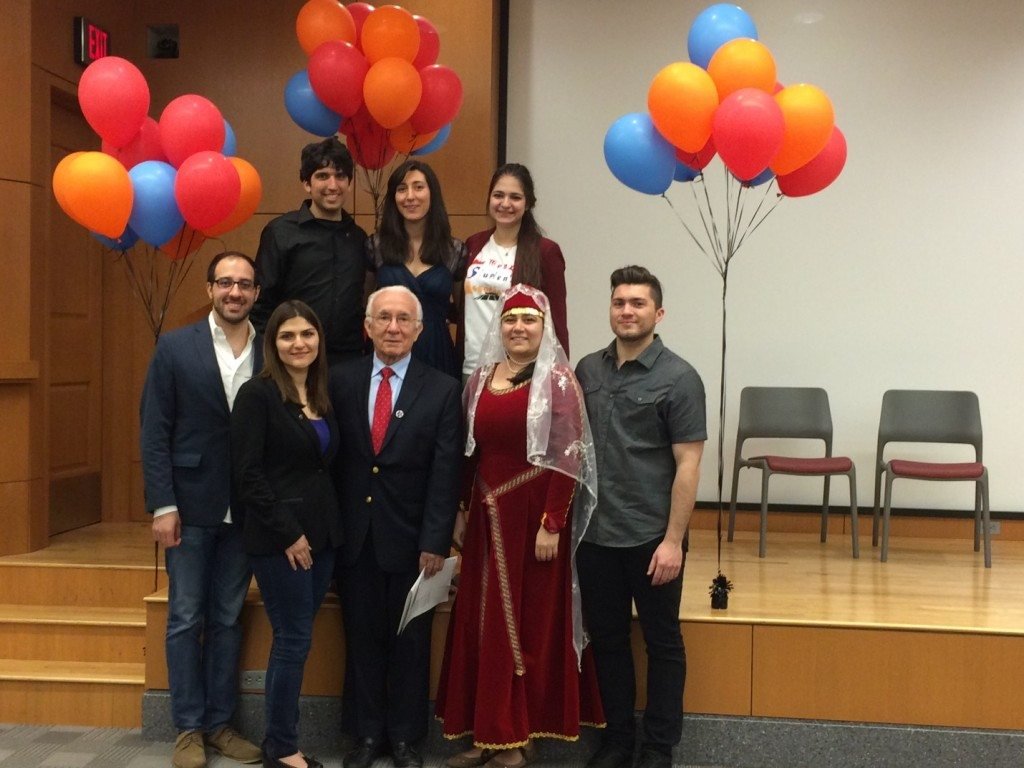On the evening of Friday, April 24, the Armenian Student Association of the Ohio State University hosted an event to commemorate the 100th anniversary of the Armenian Genocide and to celebrate the rich culture that survived—and even thrived—following genocide. Dr. Hagop. Mekhjian, the Armenian Student Association’s faculty advisor, kicked off the event, which was attended by more than 200 students, OSU faculty, and community members. During Mekhjian’s heartfelt remarks, he quoted the Armenian-American author William Saroyan:
“I should like to see any power of the world destroy this race, this small tribe of unimportant people, whose wars have all been fought and lost, whose structures have crumbled, literature is unread, music is unheard, and prayers are no more answered. Go ahead, destroy Armenia. See if you can do it. Send them into the desert without bread or water. Burn their homes and churches. Then see if they will not laugh, sing, and pray again. For when two of them meet anywhere in the world, see if they will not create a New Armenia.”

Mekhjian proudly stated, “That’s what we are. We have created the New Armenia, all over the world. We are truly here today to dispel the myth that they can destroy our songs, our literature, and our prayers because this evening you’ll hear our poetry, you will hear our music, and you will hear our prayers. So we are indestructible. I am living testimony of that survival: I’m the product of two orphaned parents and the first generation of New Armenia.”
The president of the Armenian Student Association, Gregory Simonian, remarked, “It’s been said that the Armenian Genocide consisted of two crimes: the first being the genocide itself and the second being the denial of truth, which continues to this day. Today being the Centennial—100 years have passed since the genocide took place. This means all the survivors have passed away, taking their memories and stories with them.” Simonian emphasized the need for all Armenians in the diaspora to preserve the stories of the past. He then introduced the keynote speaker, Armenian-American poet Silva Merjanian.
Merjanian, the author of two books, Uncoil the Night and Rumor, gave a powerful talk on the genocide’s impact on Armenian poetry. She emphatically stated, “When we think of the poets killed, our grief and outrage at this injustice transcends the physical loss of a single human being and it extends to the intellectual wealth we were robbed of with these murders, the human potential that can’t be quantified. With most murdered in their prime, we lost all the future works of these poets.” Merjanian graced the audience with a reading of her own poetry, including Where the Truth is Strewn, the story of finding human remains—likely from the genocide—at the construction site of an elementary school.
Merjanian concluded her talk with a quote from Armenian author Ruben Sevak: “We are few, but we are called Armenians. We do not put ourselves above anyone. Simply our fortune has just been so different. Simply we have just shed too much blood… If we have enslaved – only with our eyes. And if we have ruled – only with our books. If we have prevailed – only with our talents. And if we have ever oppressed, it has only been with our wounds. See, we do not put ourselves above anyone. But we know ourselves. We are called Armenians. And why should we not feel pride about that? We are, we shall be and become many.”
After thunderous applause, Tatevic Broudian, the treasurer of the Armenian Student Association, introduced the world premiere of the movie, “Traversed: A Visual Journey Through Armenia,” directed by Alex Igidbashian and Emily Mkrtichian. The movie is a short documentary that depicts the character of Armenia through the stories of its vast primordial landscapes, ancient churches, rural villages, fields cultivated by families and small communities, industrial factories left over from the Soviet era, and its cities, growing and changing by the minute as they open up to the world of global trade and capitalism. In addition to the visual stories of Armenia, the film displays stories of people the directors meet along the way. “Traversed” gives people around the world a beautiful glimpse into this ancient and modern world.
Following the documentary, Armine Aghabekian, founder and vice president of the Armenian Student Association, introduced the evening’s musical program, a five-piece ensemble from “Opera Project Columbus,” who performed works by Armenian composers Komidas Vartapet and Aram Ilyich Khachaturian. Coral Owdom, a highly regarded soprano, delivered a soulful rendition of “The Crane” and “Our Lord’s Prayer” in Armenian.
In closing, Dr. Ryan Nash, the director of the Ohio State University’s Center for Bioethics and Medical Humanities, introduced Very Reverend Miroljub Ruzic, rector of St. Nicholas the Wonderworker Orthodox Church in Columbus, who sang a traditional prayer remembering those who gave their lives for the sake of the faith. Members of the audience sang and prayed along.
Dominic Monley, Peace Corps volunteer from 2006-08 in Armenia, enjoyed the program tremendously. Monley said, “The ‘Traversed’ documentary was a highlight for me, as it provided a visual backdrop to all this amazing culture by putting it in the context of the beautiful landscapes of the Republic of Armenia. I was also impressed by the size and diversity of the audience. I’m grateful to Dr. Mekhjian and the Armenian Student Association for providing a space for remembrance of the Armenian Genocide and, for those less familiar, a chance to learn more about Armenian culture and the historical events that have shaped it.”



Be the first to comment